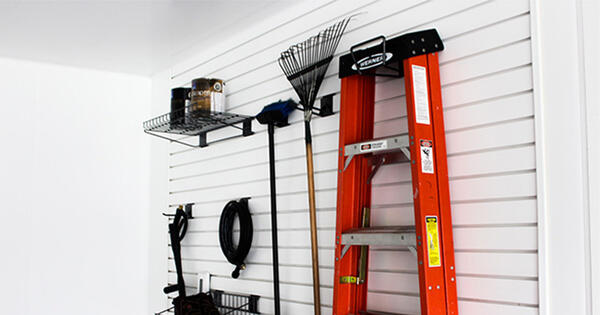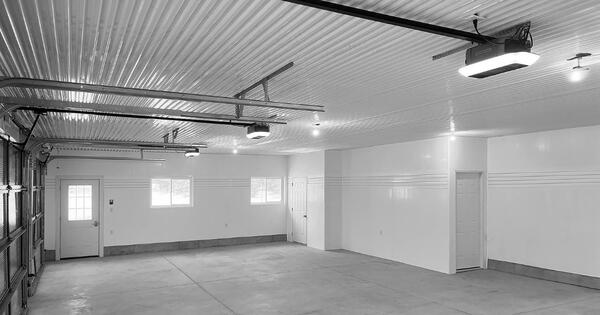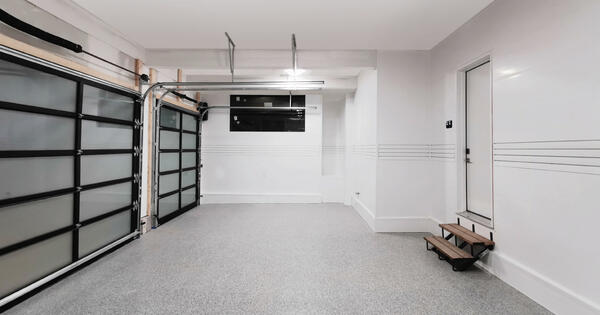Selecting the right paint for your garage walls isn't just about aesthetics; it's about functionality, too. Your garage is more than just a space to park your car — it's a workshop, a storage area, and perhaps even a place for hobbies.
Choosing the best paint can enhance the overall look of your garage while also providing protection against the unique challenges posed by this environment.

Considerations to Make When Picking the Best Paint for Garage Walls
When it comes to painting your garage walls, it's essential to consider the unique environment the paint will be subjected to. The garage is often one of the most neglected spaces in the home regarding maintenance, yet it faces some of the harshest conditions. Here's a closer look at the environmental factors that can impact your garage walls:
- Temperature Fluctuations: Garage temperatures can vary dramatically throughout the year, from sweltering heat in the summer to freezing cold in the winter. These fluctuations can cause traditional paints to expand and contract, leading to cracking and peeling over time.
- High Humidity: Garages are notorious for their high humidity levels, especially in regions with humid climates or during rainy seasons. Excess moisture in the air can promote mold and mildew growth, leading to unsightly stains and odors on your walls.
- Exposure to Moisture: Whether from rain, snow, or spills, garages are often subjected to moisture infiltration. Water can seep through walls and floors, leading to water damage and paint deterioration if not properly addressed.
- Chemical Exposure: Garages are frequently exposed to a variety of chemicals, including gasoline, oils, and cleaning products. These substances can be corrosive and damaging to traditional paint finishes, leading to discoloration and deterioration over time.
Considering these factors, it's crucial to choose a paint that can withstand the rigors of the garage environment while providing long-lasting protection and durability.



The Best Types of Paint for Garage Walls
When it comes to choosing the right paint for your garage walls, there are several options to consider, each with its own set of advantages and disadvantages.
Latex Paint
Latex paint, also known as acrylic latex paint, is a water-based paint that contains acrylic resins.
Pros:
- Latex paint is easy to clean up with water, making it beginner-friendly.
- It dries quickly, allowing for faster project completion.
- Low odor and emits fewer harmful fumes during application.
- The paint is flexible and resistant to cracking, making it suitable for temperature fluctuations.
- Its wide availability and affordability make it a popular choice for DIY projects.
Cons:
- It may not provide as durable a finish as other types of paint.
- Less resistant to moisture and chemicals compared to acrylic or epoxy paint.
- The paint may require multiple coats for adequate coverage, especially on porous surfaces.
- Limited color options compared to other types of paint.
Acrylic Paint
Pros:
- Acrylic paint is more durable and resistant to wear and tear compared to latex paint.
- It provides excellent adhesion to a variety of surfaces, including concrete and masonry.
- The paint is available in a wide range of colors and finishes for customization.
- It’s resistant to moisture and chemicals, making it ideal for garage walls.
Cons:
- Acrylic paint may be more expensive than latex paint.
- Requires proper surface preparation for optimal adhesion.
- It may require multiple coats for adequate coverage.
- Can dry quickly, making it challenging to work with in hot or dry conditions.
Epoxy Paint
Epoxy paint is a two-part coating system consisting of a resin and a hardener that chemically react to form a tough, durable finish.
Pros:
- Epoxy paint is extremely durable and resistant to chemicals, abrasion, and stains.
- It provides a seamless, high-gloss finish that is easy to clean.
- The paint has excellent adhesion to concrete and other porous surfaces.
- It is available in a variety of colors and finishes, including metallic options.
- Offers long-lasting protection against moisture and wear.
Cons:
- The paint requires careful surface preparation and application due to its two-part system.
- Can be challenging to work with, especially for beginners.
- Longer drying times between coats.
- Limited working time once mixed, so it must be applied quickly.
- May be more expensive than other types of paint.
Oil-Based Paint
Oil-based paint, also known as alkyd paint, is made from a combination of oil, resins, and solvents.
Pros:
- Oil-based paint is exceptionally durable and resistant to wear and tear.
- It provides a hard, durable finish that is resistant to chipping and peeling.
- The paint offers excellent adhesion to a variety of surfaces, including wood and metal.
- It has superior coverage and hiding power compared to water-based paints.
- It’s suitable for high-traffic areas like garage walls.
Cons:
- Emits strong fumes and requires adequate ventilation during application.
- Longer drying times compared to water-based paints.
- The paint may yellow over time, especially in areas with limited sunlight exposure.
- Cleanup requires solvents such as mineral spirits.
- Limited availability of environmentally friendly options.
Color and Finish Options for Garage Wall Paint
When selecting paint colors for your garage walls, consider factors such as lighting and personal preferences. Lighter colors can help brighten up the space and make it feel more inviting, while darker colors can hide dirt and stains more effectively.
As for finishes, here are some options to consider:
- Matte: Matte finishes provide a smooth, non-reflective surface that can help hide imperfections in the wall.
- Satin: Satin finishes offer a subtle sheen that is easy to clean and resistant to moisture and stains.
- Semi-Gloss: Semi-gloss finishes provide a slight shine and are highly durable, making them ideal for high-traffic areas like garage walls.
- Gloss: Gloss finishes offer a high sheen and maximum durability, but they can highlight imperfections in the wall surface.




Top Recommended Paint Brands for Garage Walls
When it comes to choosing the best paint for your garage walls, quality matters. Here are some top paint brands known for producing high-quality paint suitable for garage environments:
- Sherwin-Williams: Sherwin-Williams offers a wide range of paint options designed to withstand the rigors of garage life, including their popular Duration and SuperPaint lines.
- Behr: Behr paints are known for their exceptional durability and coverage, making them an excellent choice for garage walls. Their Premium Plus and Marquee lines are particularly well-suited for high-traffic areas.
- Benjamin Moore: Benjamin Moore paints are renowned for their rich colors and long-lasting finish. Their Regal Select and Aura lines are highly recommended for garage walls due to their superior durability and stain resistance.
- BeautiTone: BeautiTone paints are sold by Home Hardware in Canada and offer a comprehensive line of interior, exterior, and specialty paints and primers. The Signature Series Beauti-Tone Signature Series is available in flat, velvet, eggshell, pearl, semi-gloss, and gloss sheens.
Preparing Garage Walls for Painting
Before you start painting your garage walls, it's essential to properly prepare the surface. Here's a few tips to help you get started:
- Clean the Walls: Remove any dirt, dust, or grease from the walls using a mild detergent and water solution. Scrub the surface with a stiff brush or sponge, then rinse thoroughly and allow to dry completely.
- Repair Any Damage: Fill any cracks, holes, or dents in the wall with spackling compound or filler. Sand the repaired areas smooth once dry to ensure a uniform surface.
- Prime the Surface: Apply a coat of primer to the walls to help seal the surface and improve paint adhesion. Choose a primer specifically formulated for use on garage walls and follow the manufacturer's instructions for application.

Choose PVC Panels for a Paint-Free Garage
The best paint for garages is actually no paint at all. With pre-finished PVC panels like Trusscore Wall&CeilingBoard, you can leave the paint at the store and create high-performing garage walls that will stand the test of time.
Available in white and gray, Trusscore Wall&CeilingBoard can be installed directly to studs or on top of existing drywall. Panels are scratch, dent, and damage resistant, are 100% moisture and water resistant, are easy to clean with chemical cleaners, and will never grow mold or mildew, and will never rot, rust, yellow, or fade. It can also be installed alongside Trusscore SlatWall to seamlessly create an on-the-wall storage system.
And if you’re sold on painting your garage and want to install a high-performing drywall alternative like Trusscore? You can paint the panels, too.
Choosing the best paint for your garage walls requires careful consideration of factors such as durability, resistance to elements, and personal preferences. By selecting the right paint and properly preparing the surface, you can ensure that your garage walls not only look great but also stand up to the demands of everyday use. So, take your time, do your research, and invest in a high-quality paint that will keep your garage looking its best for years to come.





